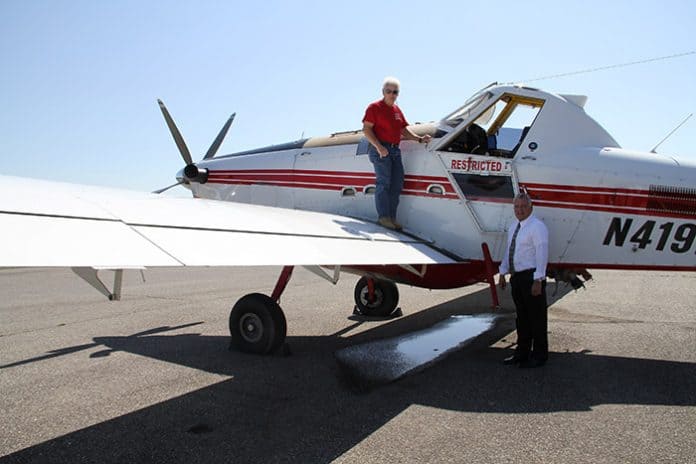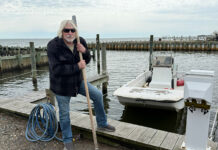
BERKELEY TOWNSHIP – As forest fire season continues in Ocean County, the Ocean County Airport, here, is again the temporary home to a single engine air tanker operated by the New Jersey State Forest Fire Service.
Having already been tapped at least a half dozen times this season to drop water over brush fires in the central part of the state, the Air Tractor 802 Fire Boss can hold up to 800 gallons of water and is flown by Steven Fletcher, President of Fletcher Flying Service.
With a keen eye, Fletcher is tasked with dropping water on the right spot to put out or get under control brush fires that are frequent this time of year.
“We are pleased to provide the forest fire service with a state of the art facility where they can house an air tanker and easily access areas that may be affected by a forest fire,” said Ocean County Freeholder Joseph H. Vicari, liaison to the Ocean County Airport.
The Ocean County Board of Chosen Freeholders entered into an agreement with the state Forest Fire Service allowing it to base its plane at the airport from mid-April to mid-May. The plane has been scheduled to leave Ocean County May 11.
“This time of year is the height of forest fire season,” said Freeholder John P. Kelly, Director of Law and Public Safety. “We appreciate the efforts of the state Forest Fire Service and all of our volunteer fire companies in making certain our residents and visitors are kept from harms’ way during this time.”
Vicari noted that the Forest Fire Service returned to the Ocean County Airport after the County opened the crosswind runway in September 2014 creating a safer airport.
“The safety of the pilots using the airport is of the utmost importance to the County,” said Ocean County Freeholder Director Gerry P. Little. “The airport is used for more than just private planes. It serves an important role when it comes to public safety, and housing aircraft that are used by public safety agencies.”
Vicari said the crosswind runway provides pilots with safer landing and takeoff alternatives during adverse wind conditions.
“Because the worst forest fires usually coincide with high winds, prior to completion of the crosswind runway, the Forest Fire Service had to cancel previous missions due to strong crosswinds,” he said.
Vicari said Ocean County has seen its share of large and dangerous brush fires.
He noted that shortly after the completion of the crosswind runway, a major forest fire broke out that threatened several neighborhoods just a few miles from the airpark.
“The Forest Fire Service had the use of the crosswind runway which helped the fire service in its efforts to save many homes from destruction,” he said. “We are pleased to offer this invaluable service to the Forest Fire Service.”
Last year, while based at the airport, the air tanker was used to respond to six forest fires, delivering more than 6,400 gallons of water in 14 drops to the fire sites.
According to the state Department of Environmental Protection, the peak wildfire season in New Jersey typically begins in middle to late March and runs through late spring, when the weather tends to be dry, windy and warmer. This also is the time of year when forest canopies and undergrowth have yet to leaf out, making forest debris more susceptible to the drying effects of wind and sunshine.
The DEP and Ocean County participated in prescribed burns in order to minimize the potential for forest and brush fires. Prescribed burns usually take place through the end of March, conditions permitting. These burns are generally conducted during the winter – especially toward the late-winter months – to minimize the amount of smoke produced, and when weather conditions tend to be safer for controlled fires.
Prescribed burning is an important tool in keeping forests and other wildlands safe and healthy. These burns are conducted only under exacting conditions by highly trained personnel.
Prescribed burns reduce the risk of the materials serving as tinder for wildfires later in the year. This practice also improves the overall ecological health of forests and grasslands.
“This is also a good time to remind residents and visitors to be particularly vigilant when driving or out in the woods to properly discard any smoking materials or not engage in this kind of activity,” Kelly said. “So many forest and brush fires are caused by human error or carelessness. They can easily be prevented.”
Vicari noted anyone convicted of purposely starting a forest or brush fire faces serious criminal penalties.
The Ocean County Airport is located on 420 acres in Berkeley Township about five miles west of Toms River. A precision approach facility, it features a 6,000 foot runway and accommodates various aircraft, including private airplanes, small corporate jets, the state Forest Fire Service planes, the Civil Air Patrol and Emergency Services aircraft.







